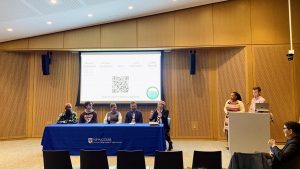Students feel restless with the progress of LGBTQ+ health at Tulane
January 30, 2020
Faculty and students filled the Diboll Gallery in the brand new Newcomb Institute on Tuesday, Jan. 28, for the first ever LGBTQ+ Health Town Hall. Representatives from different student organizations as well as health-related offices on campus were present for the event hosted by the Student Health and Wellness Committee of the Undergraduate Student Government.
Keynote speaker Dr. Laura Wernick of Fordham University presented on “the impact of community engagement such as community participation, activism, advocacy, and organizing on the mental health and wellness outcome among LGBTQ+ students.”

The types of transformative community organizing Dr. Wernick spoke about focused on group storytelling as a way of healing and building community among LGBTQ+ folks. In her experiences, group storytelling and performances allowed LGBTQ+ youth to share stories of past trauma, connect their experiences to those of other marginalized groups as well as institutional, historical, social and political contexts.
Groups involved with this kind of organizing came to see themselves as part of a collective struggle. As a result, participants were able to act as change agents, strengthening their personal and collective confidence and empowerment.
After the keynote, a panel of students, faculty and community providers held a town hall on health issues pertaining to the LGBTQ+ community at Tulane. Panelists included students Lucien Mensah and Lucía Paternostro; Alicia K. Czachowsk, the director of The Well for Health Promotion; Andrew Davenport, nurse practitioner at the Tulane Health Center; and the Patient Navigator for the Gender Clinic at CrescentCare, Dietz. Students were able to submit questions before the panel through an online form, as well as during the panel by scanning a QR code.
Many of the questions from students inquired about improvements Campus Health and the Tulane administration could make to improve the lives of LGBTQ+ students at Tulane.
Some of the changes coming out of Campus Health that are currently in the works include working with the Office for Gender and Sexual Diversity on programming and initiatives on sexual assault and sexual health, more staff competency trainings and hosting more sex positive, inclusive conversations on campus about sexual health for the LGBTQ+ community. Additionally, The Carolyn Barber Pierre Center for Intercultural Life will be starting a new queer healing space on campus, allowing students to hold themselves accountable for transgressions against the queer community.
Suggestions for further improvements from panelists Mensah and Paternostro included trans-focused therapists at CAPS, more knowledge about trans experiences from campus medical providers and more accessible healthcare for LGBTQ+ students on Medicaid.
Both the keynote address and the town hall offered lots of information to attendees and were receptive to student input. While panelists seemed sincere in their desire to work toward a better Tulane for LGBTQ+ students, there also appeared to be a feeling of unrest bordering on frustration.
There seemed to be a disconnect between the attitudes about the progress being made and the concrete effect it is having on students. Mensah said that, while there is indeed support for queer students on campus, it almost exclusively comes out of The O. Mensah mentioned that safety measures on campus seem “performative,” with many professors still perpetuating harmful language and stereotypes in classrooms.
An exercise during Dr. Wernick’s address asked audience members to talk to their neighbors about an experience in which they felt oppressed and how they felt to address that oppression. “Exhausted” was the first word to be called out from the audience.
While the LGBTQ+ community at Tulane benefits from the University’s ability to provide services like a gender exploration society and STI testing through the student health center, these same students, queer and trans students of color in particular, continue to report experiencing oppression because of their identities on a daily basis. Those sorts of experiences are not something that can be assuaged by a town hall, the best intentions of organizers notwithstanding.
The approximately 30 people in that room might be the only ones on this campus working towards making our campus safer for LGBTQ+ students. The path toward Tulane being as accomodating to queer and trans students as to their straight, cisgendered peers will likely take constant fighting, organizing and slow, painful change. But every conversation, every town hall and every organized effort is a step in the right direction.








Leave a Comment